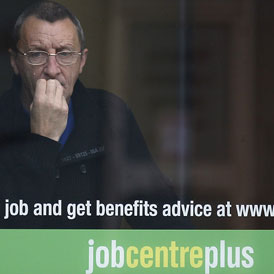Record inflation rise piles pressure on
With inflation rising to match record highs, Channel 4 News looks at the effect on the economy and consumer and considers if there are any reasons to be cheerful.
Chancellor George Osborne is relying on an £81bn programme of spending cuts and tax increases to tackle the deficit and ultimately revive the economy, but the latest inflation figures make his task harder.
The retail prices index (RPI), which includes housing costs, rose from 5.2 to 5.6 per cent in September, while the consumer prices index (CPI), used to set benefit levels, increased from 4.5 to 5.2 per cent.
With unemployment hitting a 17-year high of 2.57 million in the three months to August, the benefits bill is increasing, which is putting further strain on the public finances as the chancellor wields his axe.

Benefits and pensions
September’s CPI figures are used to set next April’s benefit levels, and based on the latest data, jobseeker’s allowance would rise by £3.51 to £71.01 a week. CPI also determines pension increases, with the basic single state pension set to rise by £5.31 to £107.46, and the joint state pension jumping by £8.49 to £171.84.
The prime minister’s official spokesman said today that the final decision on benefit and pension increases would be announced by the chancellor in his autumn statement on 29 November.
In March, the independent Office for Budget Responsibility (OBR), whose forecasts are used by the government, predicted that CPI inflation in September would be 4.3 per cent – 0.9 per cent lower than it is today.
£1.8bn bill
A “back of the envelope calculation” by the Institute for Fiscal Studies estimates that spending on social security benefits and tax credits will be £1.8bn higher in 2012-13. This is a significant sum of money, but must be seen in the context of a forecast deficit of £101bn next year.
The surge in inflation was driven by a rise in utility bills, with gas and electricity costs increasing by 13 and 7.5 per cent respectively following price hikes from Scottish & Southern Energy, E.ON, British Gas and Scottish Power.
The Office for National Statistics expects next month’s inflation figures to be similarly affected by rises recently announced by EDF and Npower. But it is not just fuel bills pushing up inflation. Bank of England Governor, Sir Mervyn King, has said that January’s rise in VAT from 17.5 to 20 per cent is also leading to spiralling prices.
Pity the consumer
Consumers are having to contend with an economy that is barely growing, high inflation and rising unemployment – at a time earnings are increasing by just 1.8 per cent.

Public sector jobs are being cut at a faster rate than the government expects, according to the Chartered Institute of Personnel and Development (CIPD). The organisation expects 600,000 jobs to go by 2015-16, a third more than ministers have said.
Many of those remaining in their jobs are enduring a two-year wage freeze – tolerable when inflation is very low, but tough when it is high.
Reasons to be cheerful
Amid the gloom, are there any reasons to be cheerful? Yes, according to the government. Mortgage rates are historically low because base rate, set by the Bank of England’s monetary policy committee, is at just 0.5 per cent.
So while consumers are facing challenges, at least they know their mortgages are being kept as affordable as possible. But what is good news for borrowers is bad for savers: low rates are particularly difficult for those on fixed incomes, like pensioners.
Another positive is that thanks to Britain’s AAA credit rating, the government is able to finance its borrowing cheaply.
Employers are looking at ways of cutting costs without making people redundant. Charles Cotton, CIPD
Charles Cotton, from the CIPD, pointed out that unemployment has not reached the levels seen in previous recessions, partly because private sector employers are keeping wages under control rather than sacking staff.
“It seems employers are trying to juggle wage costs and other costs without necessarily resorting to redundancy. Employers are looking at ways of cutting costs without making people redundant. It’s a reflection of what happened previously when they got rid of staff and realised they had to re-employ a couple of years later. That is learning from past times.”
Topics
Business,UK, Bank of England, Banking, Boom and bust, Coalition, Conservative Party, CutsCheck, David Cameron, Economic crisis: special report, Ed Balls, Ed Miliband, Energy prices, George Osborne, Gordon Brown, Inflation, Interest rates, Labour Party, Liberal Democrats, Mortgages, Nick Clegg, Pensions, Public Sector, Spending cuts, Spending review (CSR), UK economy, Unemployment-
Latest news
-
Year of civil war in Sudan ‘a nightmare of hunger and displacement’4m

-
Israel fears repeat Iran attack, says former editor of Jerusalem Post4m

-
How long could it take to clear the Rwanda asylum seeker backlog?3m

-
Rwanda asylum boost for Sunak as bill expected to become law2m

-
Donald Trump trial: day one of historic Stormy Daniels court case4m

-




